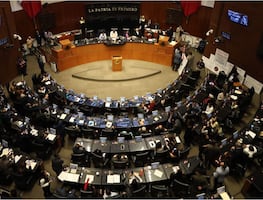Más Información

Senado guarda un minuto de silencio por la muerte de Silvia Pinal; políticos se suman a las condolencias

Imjuve y agencias de la ONU se reúnen en favor de las juventudes; tratan reclutamiento de jóvenes del crimen organizado

Por contrabando van por extinción de dominio de plaza de Izazaga; IMPI destruirá 90 mil piezas de productos pirata
“I'll come back from Cuba to Juchitán, a great neurosurgeon,” Germán Luis promised his mother Florinda, an elementary school teacher and promoter of the Zapotec language.
The promise was fulfilled 17 years later; however, Florinda was no longer alive. Now Germán provides medical attention in a camp to thousands of victims of the September 7 and 19 earthquakes .
Germán regrets the conditions which forced him to return to Mexico, after almost two decades of earning a scholarship to study neurosurgery in Cuba , but he feels like the luckiest doctor in the country, being part of The Henry Reeve International Medical Brigade ( HRIMB ) of Cuba , which has been providing medical attention to the earthquake victims in the region of the Tehuantepec Isthmus since last week.
Germán graduated in Medicine from the Latin American School of Medicine, and a few months ago he concluded his specialty in neurosurgery . He was working on validating his studies in Mexico when he found out the 8.2 magnitude earthquake had killed his mother and left his brothers homeless. Without thinking twice, he got on the first plane he could and returned to mourn his loss.
“I didn't want to come back like this, but I did, because I'm a victim, my brothers are victims, my mother, even if she's no longer alive, is a victim. The house she built collapsed. I came back and I saw everything which linked me to her and this land destroyed. Then I found out the Cuban Brigade was coming to provide humanitarian aid and I asked to join them. Here I met with my professors, with my other homeland. Here I live with them. I'm another Cuban helping the Mexican people,” he said in front of the Cuban flag waving at the center of the camp.
The forty health professionals – German is the number 41 – have set camp in the sports field Che-nita, located between the communities of Asunción Ixtaltepec and Ixtepec City – in the first 60% of the houses collapsed, while in the second the 30-bed hospital which serviced the Zapotec communities suffered severe damages. Brigade members are under the charge of Cuban epidemiologist Rolando Piloto Tamé.
He goes from one place to another, giving orders, verifying their attention system is operating within adequate conditions.
He is proud of his team: 19 doctors, 18 graduates and 3 people specializing in logistics. He feels at home and within reason – they have even brought a cook for their 30-day stay in Mexico .
Like any other Cuban, he is proud of his country and of the revolution his General Fidel Castro fought; he gave us the exact date of the foundation of the Brigade, known worldwide for their humanitarian participation since 2005 in 19 countries, with 27 missions in Indonesia, Pakistán, Nepal, and Sierra Leone – where 256 members were dispatched to assist during the Ebola outbreak .
The kinship with Mexico is the first he highlights when asked about their reason for being here. He remembers when all other Latin American countries turned they back on them after the U.S. trade embargo, yet Mexico was the only one who stayed with them. According to Ronaldo, this is what it means to remember; this is why every time the Mexican people face a tragedy, they are there to lend a hand.
During the first three days, the brigade brought two tents where they provide medical attention to one thousand 575 hundred people – 17 operations, over 170 ultrasounds, and 150 lab tests.
Even after the direst part of the earthquake has passed, the health centers which collapsed have left regular patients with chronic illnesses unattended.
Every day from nine in the morning, the Brigade offers medical attention through several specialties: neurosurgery, orthopedics, pediatric surgery, OB/GYN, traumatology, psychiatry, and general medicine – assistance which is needed because out of the 13 hospitals in the region, four are closed.
In addition to the Cuban brigade, the Mexican Government has established 28 shelters, 26 camps, and five community diners in the 10 priority-one communities, servicing four thousand 524 hundred people.
am







